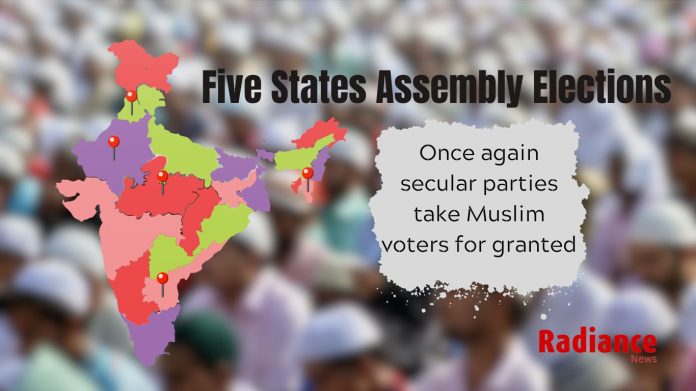Congress has recently made social justice one of its primary plank for elections, however it appears that minorities, especially Muslims, do not fit into the party’s agenda.

By Abdul Bari Masoud
The campaign for the assembly elections in Telangana, Mizoram, Madhya Pradesh, Rajasthan, and Chhattisgarh is under way. These elections are regarded as the semifinal round for the general elections 2024.
The Congress Party governs Rajasthan and Chhattisgarh, the BJP rules Madhya Pradesh, Bharat Rashtra Samithi (BRS) rules Telangana, and the Mizo National Front (MNF) rules Mizoram. While the BJP and Congress are engaged in bipolar battles in Madhya Pradesh, Chhattisgarh and Rajasthan, the ruling BRS and the Congress are engaged in a triangular struggle in Telangana.
Only Chhattisgarh will have two phases for the elections, on November 7 and 17, to choose the 90 assembly constituencies. Elections in Mizoram, which has 40 assembly seats, and Chhattisgarh’s first phase were scheduled for November 7. Elections for Madhya Pradesh’s 230 assembly constituencies are scheduled for November 17; Rajasthan’s 200 assembly seats will be chosen on November 23. On November 30, Telangana, which has 119 assembly seats, will cast its ballot.
As far as Muslims are concerned, they make up a significant portion of the population in Telangana, Rajasthan, and to a lesser extent in Madhya Pradesh, although they have been steadily marginalized politically prior to the rise of fascist Hindutva groups.
Muslims, who officially make up more than 12.7% of the electorate in Telangana, will control the course of political parties in at least 40% of the 119 assembly constituencies in the state. They can be found in practically every Telangana district; however, they are most concentrated in the districts of Hyderabad, Ranga Reddy, Mahbubnagar, Nalgonda, Medak, Nizamabad, and Karimnagar. A quarter of the city’s population and 43.5% of the state’s Muslim population, or 1.73 million people, live in Hyderabad alone, according to the Telangana Social Development Report 2017. There are 24 assembly seats in the city, and Muslim voters have the power to change the result in 10 of them. The majority of Hyderabad’s Muslim population lives in the old city, which has been under the control of Majlis-e-Ittehadul Muslimeen (MIM) for the past 20 years. In the old city, the party has routinely won each of the seven assembly seats. This time, it is also contesting only 8 seats.
Prior to 2014, MIM was vehemently against the split of Andhra Pradesh, believing that it would lead to polarization of Hindutva votes and the subsequent rise of BJP in Telangana. But once the new state was formed, Telangana Rashtra Samithi (TRS) gained strength, and MIM softened its stance, and allied with TRS, which was rechristened BRS. MIM left the seats in places such as Asifabad, Mahbubnagar, and Medak for BRS.
There are eight Muslim MLAs in the outgoing legislature; seven of them are from the MIM and one from TRS.
A senior MIM leader said that after the Babri Masjid demolition, the Muslims no longer have faith in the Congress, and it has not been able to stop BJP from expanding. However, the Muslims have been allowed to live in a safe atmosphere thanks to the TRS.
Now Congress is making efforts to win back the Muslim voter base. It has formed the Minorities Declaration Committee (MDC) under the leadership of senior Congress leader and former minister Mohammed Ali Shabbir.
Ahead of the elections, the Congress launched a broad outreach among minorities in Telangana, having lost a significant portion of its Muslim support base to the ruling BRS. The MDC met for the first time, laying out a plan to engage with different groups and gather feedback.
In Rajasthan, eight Muslim candidates won in 2018, seven from Congress, and one from BSP.
Even though it’s significant to note that this is the first time since 1998 that no Muslim has won from BJP in the 2018 elections, it is also worthy to note that BJP’s ouster from Rajasthan has also led to a greater number of Muslim candidates getting elected to the state legislature. The BJP fielded only one Muslim candidate, Younus Khan, against Sachin Pilot in Tonk, who lost. In contrast to the 2013 elections, which produced just two Muslim MLAs for the Rajasthan assembly, seven Muslims from the Congress and one from BSP became victorious in this election. In these elections, the Congress provided tickets to 15 Muslims. This time, Muslims demanded more tickets, but the Congress did not oblige.
According to the 2011 Census, over 7% of Madhya Pradesh’s population is Muslim; however, that number may now range between 9% and 10%. It is said that Muslims have an impact on 47 assembly seats and 22 segments, making their vote crucial.
In the 2018 election, two Muslim MLAs – Arif Aqeel and Arif Masood, both from Congress – were elected to represent Bhopal (North) and Bhopal (Central). Only one Muslim had won in 2013.
In contrast to Uttar Pradesh and Bihar, Madhya Pradesh’s binary politics favors BJP and Congress, so the ‘Muslim vote factor’ could not matter as much. However, if there is a close race for at least 22 seats in the elections, the minority vote might become important. Mohammed Mahir, a Congressman and convenor of Madhya Pradesh Muslim Vikas Parishad, claims that Congress’s vote share increased by at least 3-4% in the 2018 elections, allowing it to barely defeat BJP. He mentioned that the head of the MP Congress, Kamal Nath, had stated in 2018 that the party could form a government if 90 percent of votes from minorities were cast in their favor. According to Mahir, minority votes for Congress were polled in response to Nath’s appeal, and the outcome was the addition of 10-12 seats to the party’s tally, something it had not been able to secure in 2008 or 2013.
Mahir claims that the number of Muslim voters in these 47 seats spans from 5,000 to 15,000, while in 22 assembly segments, their numbers are between 15,000 and 35,000. This indicates that, in a close race for 22 seats, Muslim voters could make the difference. Among other places, these seats include two in Indore, Burhanpur, Jaora, Jabalpur, and three segments from Bhopal, he added.
“This means Muslim voters are a deciding factor in 22 seats in a neck-and-neck contest. These seats include three segments from Bhopal, two in Indore, Burhanpur, Jaora, and Jabalpur, among others,” he said.
Mahir underlined that the conventional Congress vote, which also includes non-Muslims, is not being transferred to minority candidates. Area-wise, Madhya Pradesh is the second-largest state of the country, but over the years, Muslim representation has confined to the state capital, Bhopal.
Despite this, Congress has given fewer tickets to Muslims, and it is also playing soft-Hindutva cards.
In Chhattisgarh, where the Muslim population is more than 2%, only one Muslim candidate, Mohammed Akbar, was elected from Kawardha on a Congress ticket in the last election. This time also, the party fielded him from the same seat.
In the Christian-dominated Mizoram, no Muslim candidate was elected as MLA while more than 1% of the state’s population is Muslim.
A political observer questioned how Muslim political representation could increase if Muslim candidates were not sufficiently given tickets by secular parties. Congress has recently made social justice one of its primary plank for elections, however it appears that minorities, especially Muslims, do not fit into the party’s agenda.




